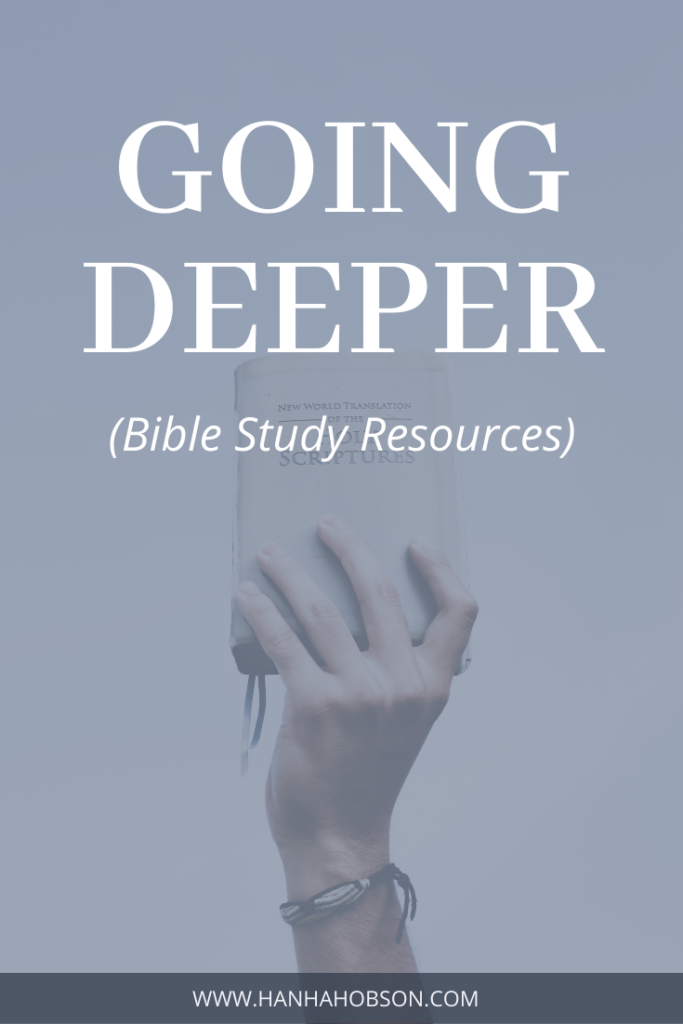Disclosure: This post contains affiliate links. If you make any purchases through the links provided, that means Hanha Hobson will earn a small commission, at no additional cost to you. Thank you in advance!
I’ve been fully emerged in Christian culture my entire life.
My parents are both in church leadership, so I was raised in the church pews and had several run-ins with the Bible on a consistent basis.
After years of Vacation Bible School, memory verse games, and weekly church services, I felt like I had a pretty good grip on what was held within its pages. However, I never really dug in the Word for myself unless there were incentives (At one point by dad would give me $50 for every Bible book I read—I tried to start with 1 &2 John but he sent me to The Gospels LOL).

For years, I continued to struggle to read the Word as my relationship with Christ developed. I would dig into the Scriptures consistently for a whole week, then let my Bible collect dust for the next 3…and the cycle would continue.
Now let me make this clear, I still struggle with consistency as life gets busier with age, but I’m at a place in my relationship with God where I realize that one-on-one time with Him MUST be a priority in my life. No and’s, if’s, or but’s. Without the Word of God, I WILL walk aimlessly and end up defeated.
In Matthew 4:4, Jesus said that “Man shall not live by bread alone, but by every word that comes from the mouth of God.” This means that if we don’t faithfully pursue God through Scripture, we will find ourselves straight up MALNOURISHED—to be truly “alive and well” goes beyond what we consume in the physical. You can eat all the veggies in the world and STILL be sick, broke-down, and exhausted (spiritually speaking).
Job understood this principle very well. In Job 23:12, He states, “I have not departed from the commandment of His lips; I have treasured the words of his mouth more than my portion of food.”
Spiritual Food
Now how many of you go a whole day without missing a meal? NOT I!
I’m a “foodie.” Invite me to a new food spot (or to Chick-fil-a for some waffle fries—y’all know those things are NEXT LEVEL lol) and I’m there in 2.5 seconds, flat…
But I had to ask myself, do I treasure God’s Word in the same way?
The Word provides nourishment to our souls and strengthens us to live a life after Christ as we seek to know Him more. It encourages and builds us up while continually pointing us back to the Author and Finisher our faith and the future we have with Him.
With that being said, my dad doesn’t have to offer me money in an attempt to encourage me to read anymore. I’ve made my decision to follow Jesus for myself…and I can’t follow Him if I don’t know Him, and I can’t know Him if I don’t spend time with Him through the reading of His Word. And neither can you.
[bctt tweet=”We can’t follow God if we don’t know Him, and we can’t know Him if we don’t spend time with Him.” username=”heyhanha”]
Jesus is Bae Challenge:
Make a decision today to get before God consistently (fight your flesh and the “I’m too busy” excuse you pull so often—Don’t front! I know the game oh too well lol). We make time for what we love. Choose to fall in love with His Word. Allow it to permeate your heart, direct, guide, and propel you into a life after God and His purposes for you. He wants to take you deeper.
[mailerlite_form form_id=3]
I hope the resources below will help you go beyond surface-level, sporadic reading to deep, consistent studying as you prioritize His Word above everything else that is pulling for your attention. It’s true, the more you seek Him, the more you know Him, and the more you know Him, the more you love Him.
Here’s to knowing, loving, and communing with God from this point forward into eternity.
Alright, let’s dive in!
BIBLE STUDY RESOURCES
1. Choose the Right Translation!
This is a MUST! You will dread reading the Bible if you don’t understand what’s being said. There are tons of amazing translation teams working hard so you don’t have to go through that stress. When I first started reading the Bible consistently I chose The Message Bible.
The King James Version was not for me with all those thou’s and shall’s so I searched for something that would bring the Word down to my level of understanding. The MSG translation was great for the time being, but I eventually realized that it wasn’t a reliable translation of the Bible. The Message is categorized as paraphrase because the editor took the content of the Bible and put it into his own words for readability and explanatory purposes (without going through the strenuous translation process).
I eventually purchased the New International Version as my first translation of choice. This version is a Thought-For-Thought translation. This means that the Bible was translated in a way that modern language users could easily comprehend (but still remained true to the biblical text).
One of my favorite translations to use when doing in depth Bible-Study is the English Standard Version. This translation is categorized as Word-For-Word which means that the translation team sought to replicate the original text to the best of their ability. These translations can be more difficult to read, but are more poetic in nature and closely align with the early manuscripts we have in our possession.
I recently purchased the She Reads Truth Bible in the Christian Standard Bible (CSB) translation which is a newer translation that is quickly becoming my favorite for readability reasons.
My suggestion is to go to Biblehub.com to skim through the various translations to find out what works best for you, or to visit a local bookstore. (*Btw, I still use The Message when studying to receive a fresh take on what I’m reading in the ESV/NIV/CSB—I wasn’t throwing shade to y’all message readers lol But I still HIGHLY recommend using another version alongside of it).
2. Purchase a Study Bible!
Once you figure out what translation you like best, purchase a study Bible with footnotes. I can’t tell you how much this transformed my time with the Lord. Whenever I came across a difficult verse, I was able to immediately go to the footnote at the bottom for a more in depth explanation, historical-context info, or an applicable tip to apply in my personal life (see example below). Two of my favorites study Bibles include the Life Application Study Bible and the ESV Study Bible—but there are tons of other great options out there. Once again, do your research and find one that works best for you!

3. Grab Additional Resources!
The Bible Study footnotes are amazing, but still limited in information. To dive even deeper into the world of the Bible, here are some resources:
1. Bible Commentary. A commentary is “a written systematic series of explanations and interpretations of Scripture. They are written by some of the most knowledgeable theologians in church history. Through a personal narrative, they provide deeper understanding and insight into the Bible, and can be valuable tools to assist both casual reading and serious study (thoughtco.com).”
One of my personal favorites is the Believers Bible Commentary, but I also use the Matthew Henry Commentary and the Wiersbe Bible Commentaries for different perspectives. These commentaries cover every book in the Bible, but you can also find commentaries devoted to an individual book of the Bible as well. These go even more in depth because they are focused on one author’s writing and one setting. I also recommend the Halley’s Bible Handbook . This resource is not an extensive commentary, but it will give you a firm grip on God’s word. It has pictures, maps, Bible study tips, and additional information on the cultural and historical setting in which the Bible unfolds. This can be extremely helpful when studying a particular topic in Scripture. It’s honestly like having everything you need in one place which, in my opinion, is worth the investment!
2. Exhaustive Concordance. The Bible wasn’t written in our native language. It was written in Hebrew, Greek, with Aramaic. In the translation process, the depth of each word may be lost if there is not a strong English equivalent.
An exhaustive concordance will help counteract this because it includes Greek and Hebrew dictionaries to aid you in better understanding the original meaning of the word that you are reading within the text. Thus, an exhaustive concordance is great for in depth Bible-study. Taking out time to discover the original meaning of a word used in Scripture will open your eyes to the true meaning behind passages that can be easily misinterpreted otherwise.

3. Bible Dictionary. “Bible dictionaries are one of the most practical and useful theological reference books available. The combination of definitions and proper names for Biblical words [people, places, customs, doctrine]…allows users to define and analyze Scripture (Bibletools.com).”
A Bible dictionary is a great tool for going deeper in your personal study. If you want to know more about something, it only takes a few seconds to find the answer. Instead of opting for google results, which is not always reliable, you can open up your Bible dictionary-written by a trusted source- to find the information that you need. For example, if you wanted to learn more about the nation of “Israel” or the city of “Thessalonica” –a Bible dictionary will be your go-to. I highly recommend the Zondervan Illustrated Bible Dictionary or the The Baker Illustrated Bible Dictionary because they’re both colorful and full of images that will help you better visualize what is being expressed (this is a pro-tip for my fellow visual learners!).
Jackie Hill Perry once said, “The Scriptures are a mine. You won’t find gold unless you slow down and dig.” I truly hope these resources will revolutionize your time with God as you seek to dig deeper. If you would like more posts pertaining to how to study the Bible or would like information on additional resources (I have a plethora), please let me know in the comments below. I would love your feedback and would be happy to share my routine(s) and tips with you guys. Stay the course, my friends!
Grace and Peace,
Danielle Marie




+ show Comments
- Hide Comments
add a comment